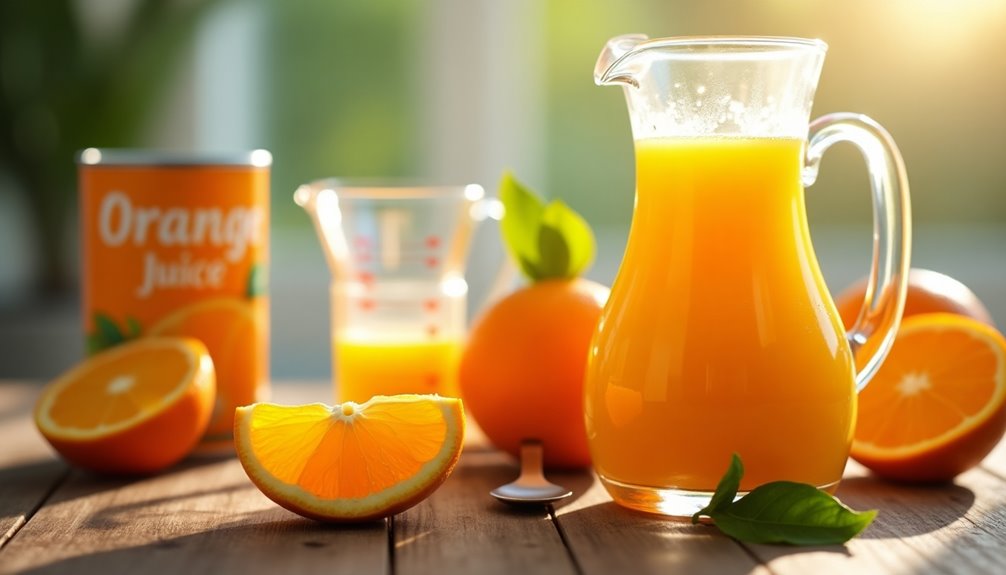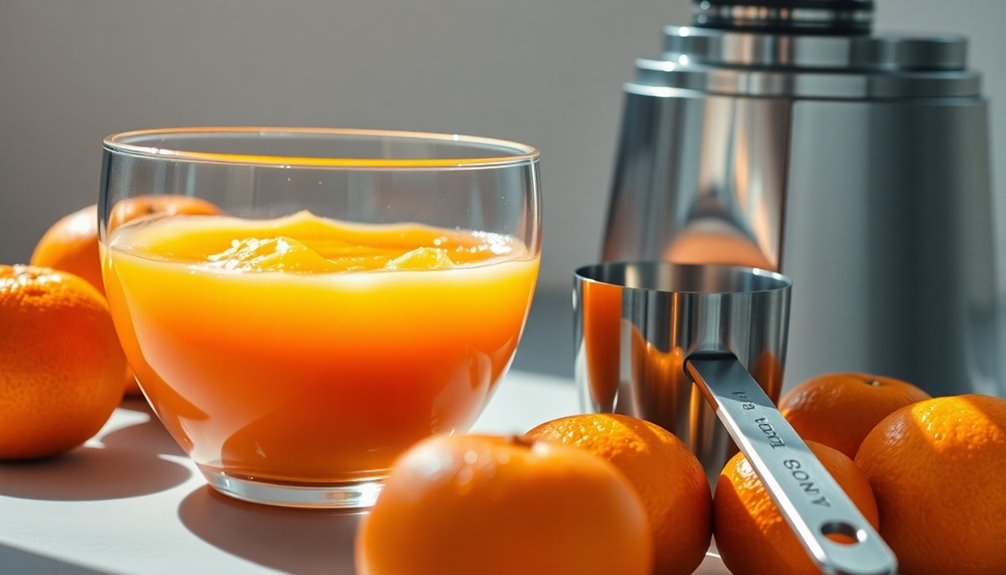To make orange juice from concentrate, thaw the frozen concentrate at room temperature. Measure equal parts of juice concentrate and water, but adjust for your preferred strength. Pour the mixture into a pitcher and stir well. You can add freshly squeezed orange juice and sweeteners like honey or sugar for extra flavor. Serve immediately, chill for later, or pour over ice with a garnish of orange slices. Discover more tips and variations to elevate your juice experience!
Key Takeaways
- Thaw the frozen juice concentrate at room temperature or use a food processor for quicker results.
- Mix 1 part juice concentrate with 1 part water; adjust for desired strength.
- Stir the mixture thoroughly to ensure even distribution of the concentrate.
- Optionally, add freshly squeezed orange juice and sweetener for enhanced flavor.
- Serve immediately over ice or chill in the refrigerator; garnish with orange slices for appeal.

Making orange juice from concentrate is a quick and easy way to enjoy a refreshing drink at home. You'll love how simple it's to whip up a glass of orange juice that tastes great and can be tailored to your preferences.
First, you need to gather your ingredients. You'll typically need juice concentrate and water, but you can also opt for a splash of freshly squeezed orange juice to enhance the flavor.
If you're using frozen juice concentrate, make sure it's fully thawed before you begin. You can leave it at room temperature for a while or speed up the process by placing it in a food processor.
Once it's thawed, it's time to mix. The standard ratio is one part juice concentrate to one part water, but you can adjust this to suit your taste. If you like your juice a little stronger, you might want to add less water. On the other hand, if you prefer it lighter, just add a little bit more.
After measuring out the juice concentrate and water, pour them into a pitcher or a bowl. Stir the mixture thoroughly—this step is crucial to ensure the concentrate is evenly distributed throughout the water.
If you want to elevate the flavor profile, consider adding a splash of freshly squeezed orange juice or a sweetener like honey or sugar. This little bit of extra effort can make your homemade orange juice taste even more vibrant and delicious.
Once your mixture is ready, you can serve it right away or chill it for a refreshing drink later. It's best served cold, so consider putting it in the refrigerator for a bit or serving it over ice.
If you're entertaining guests, adding a few orange slices as a garnish can make it visually appealing.
Another great way to enjoy your orange juice is to experiment with flavors. On a hot day, you might want to blend in some frozen fruit or even a few mint leaves for a refreshing twist.
Just remember, you can always adjust the strength of your juice by changing the ratio of juice concentrate to water.
Frequently Asked Questions
How Much Water Do You Add to Orange Juice Concentrate?
When you're mixing orange juice concentrate, the amount of water you add can really affect the taste.
Generally, you'd mix one part concentrate with about three parts water for a well-balanced flavor. If you prefer a stronger juice, you can reduce the water, but be careful not to overpower the orange taste.
Always check the packaging for specific instructions, as different brands might've their own recommended ratios for the best results.
How to Make Juice Out of Concentrate?
To transform concentrate into refreshing juice, think of it as painting a canvas.
You'll start by measuring your concentrate, then adding water in a harmonious blend. Stir it until the colors meld, creating a vibrant mixture.
For an extra burst, consider adding fresh fruit slices, like bright brushstrokes. Chill it in the refrigerator to let the flavors deepen.
Finally, pour it over ice, and enjoy your masterpiece of a drink!
How Do They Make Orange Juice From Concentrate?
To make orange juice from concentrate, they first extract juice from fresh oranges, then remove water to create a thick concentrate.
You mix this concentrate with water, usually in a 1:3 ratio, to achieve the desired taste and consistency.
After stirring, you'll notice the flavors blend beautifully.
Once mixed, it's ready to drink, giving you that refreshing orange juice experience without the hassle of squeezing the fruit yourself.
Enjoy!
Do You Add Water to Concentrated Juice?
Yes, you do add water to concentrated juice. It's essential for reconstituting the concentrate back to its original juice form.
Typically, you mix one part concentrate with three parts water, but feel free to adjust that based on your taste.
Make sure to stir the mixture well to ensure everything blends evenly. This'll help restore the volume and achieve a flavor that's more like fresh juice.
Always check the packaging for specific instructions, too.
Conclusion
In the grand journey of creating your refreshing orange juice from concentrate, you've transformed a simple task into a delightful experience. You've taken a shortcut to flavor town, enjoying the sunshine in every sip. So, next time you reach for that trusty can, remember that you're not just mixing juice; you're crafting a little moment of joy. Cheers to your homemade concoction, and may every glass bring a burst of citrusy happiness to your day!
Cindy thoroughly researches juicing trends, techniques, and recipes to provide readers with practical advice and inspiration. Her writing style is accessible, engaging, and designed to make complex concepts easy to understand. Cindy’s dedication to promoting the advantages of juicing shines through her work, empowering readers to make positive changes in their lives through the simple act of juicing.

















